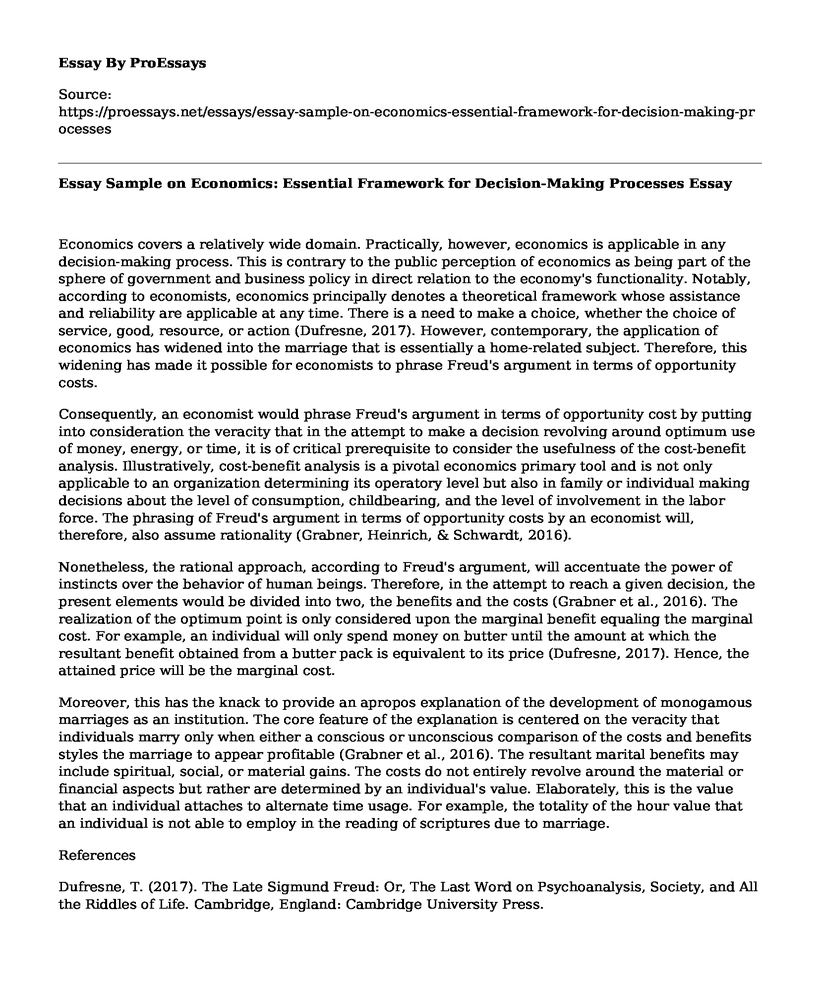Economics covers a relatively wide domain. Practically, however, economics is applicable in any decision-making process. This is contrary to the public perception of economics as being part of the sphere of government and business policy in direct relation to the economy's functionality. Notably, according to economists, economics principally denotes a theoretical framework whose assistance and reliability are applicable at any time. There is a need to make a choice, whether the choice of service, good, resource, or action (Dufresne, 2017). However, contemporary, the application of economics has widened into the marriage that is essentially a home-related subject. Therefore, this widening has made it possible for economists to phrase Freud's argument in terms of opportunity costs.
Consequently, an economist would phrase Freud's argument in terms of opportunity cost by putting into consideration the veracity that in the attempt to make a decision revolving around optimum use of money, energy, or time, it is of critical prerequisite to consider the usefulness of the cost-benefit analysis. Illustratively, cost-benefit analysis is a pivotal economics primary tool and is not only applicable to an organization determining its operatory level but also in family or individual making decisions about the level of consumption, childbearing, and the level of involvement in the labor force. The phrasing of Freud's argument in terms of opportunity costs by an economist will, therefore, also assume rationality (Grabner, Heinrich, & Schwardt, 2016).
Nonetheless, the rational approach, according to Freud's argument, will accentuate the power of instincts over the behavior of human beings. Therefore, in the attempt to reach a given decision, the present elements would be divided into two, the benefits and the costs (Grabner et al., 2016). The realization of the optimum point is only considered upon the marginal benefit equaling the marginal cost. For example, an individual will only spend money on butter until the amount at which the resultant benefit obtained from a butter pack is equivalent to its price (Dufresne, 2017). Hence, the attained price will be the marginal cost.
Moreover, this has the knack to provide an apropos explanation of the development of monogamous marriages as an institution. The core feature of the explanation is centered on the veracity that individuals marry only when either a conscious or unconscious comparison of the costs and benefits styles the marriage to appear profitable (Grabner et al., 2016). The resultant marital benefits may include spiritual, social, or material gains. The costs do not entirely revolve around the material or financial aspects but rather are determined by an individual's value. Elaborately, this is the value that an individual attaches to alternate time usage. For example, the totality of the hour value that an individual is not able to employ in the reading of scriptures due to marriage.
References
Dufresne, T. (2017). The Late Sigmund Freud: Or, The Last Word on Psychoanalysis, Society, and All the Riddles of Life. Cambridge, England: Cambridge University Press.
Grabner, C., Heinrich, T., & Schwardt, H. (2016). Policy Implications of Evolutionary and Institutional Economics. London, England: Routledge.
Cite this page
Essay Sample on Economics: Essential Framework for Decision-Making Processes. (2023, Mar 27). Retrieved from https://proessays.net/essays/essay-sample-on-economics-essential-framework-for-decision-making-processes
If you are the original author of this essay and no longer wish to have it published on the ProEssays website, please click below to request its removal:
- Vocational Rehabilitation and Re-entry Into the Workforce for the Injured Employees
- Essay Sample on Motivation Theories Explain Aspects That Inspire Employees
- Essay Sample on Effects of Globalization on Peace
- Essay Example on Retention: High Challenge for Companies in This Era
- How Big Data Uses Microeconomic Principles to Affect the Market - Essay Sample
- Essay Example on Multiemployer Pension Reform Act of 2014: Pension Reduction Benefits
- Employee Turnover: Causes, Challenges & Solutions - Essay Sample







